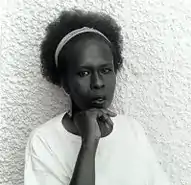Amryl Johnson
Amryl Johnson (6 April 1944 – 1 February 2001) was a writer born in Trinidad who lived most of her life in Britain.[1]
Amryl Johnson | |
|---|---|
 | |
| Born | 6 April 1944 Trinidad |
| Died | 1 February 2001 (aged 56) |
| Occupation | Poet |
| Nationality | Trinidadian British |
Life
Johnson was born in Tunapuna, Trinidad, and was brought up by her grandparents until the age of 11, when she moved to Britain to join her parents.[2][3] She attended secondary school in London and went on to study British, African and Caribbean literature at the University of Kent.[4] Much of her work concerned the diasporic nature of her life and the hostility she faced in Britain.[1] For a time, she taught at the University of Warwick but generally supported herself by writing and performing. During the late 1980s, she settled in Coventry.[1]
Sequins for a Ragged Hem (1988) narrates Johnson's second return tour to Trinidad as a spiritual "homecoming" made problematic, among other reasons, by the fact that the house where she was born had been demolished.[5]
Johnson's work was included in several anthologies, including News for Babylon: The Chatto Book of Westindian-British Poetry (1984), Let It Be Told: Essays by Black Women in Britain (1987), Watchers & Seekers: Creative Writing by Black Women in Britain (1987), Delighting the Heart (1989), Creation Fire: A CAFRA Anthology of Caribbean Women's Poetry (1990), Taking Reality by Surprise (1991), Daughters of Africa (1992) and OTHER: British and Irish Poetry since 1970 (1999).
Selected works
References
- Brown, Stuart (29 March 2001). "Obituary: Amryl Johnson". The Guardian. Retrieved 21 March 2019.
- Stringer, Jenny, ed. (1996). The Oxford Companion to Twentieth-Century Literature in English. Oxford: Oxford University Press. ISBN 9780191727573. Retrieved 21 March 2019.
- Busby, Margaret, "Amryl Johnson", Daughters of Africa, London: Jonathan Cape, 1992, p. 587.
- Dabydeen, David; Gilmore, John; Jones, Cecily, eds. (2007). The Oxford Companion to Black British History. Oxford: Oxford University Press. ISBN 9780191727337. Retrieved 21 March 2019.
- Tobias Döring (2002). Caribbean-English Passages: Intertexuality in a Postcolonial Tradition. Psychology Press. pp. 45–6. ISBN 978-0-415-25584-4.
- "Obituary: Amryl Johnson". Coventry & Warwickshire Network (CWN). 13 February 2001.
External links
- "Amryl Johnson" at Spoken Word Archive